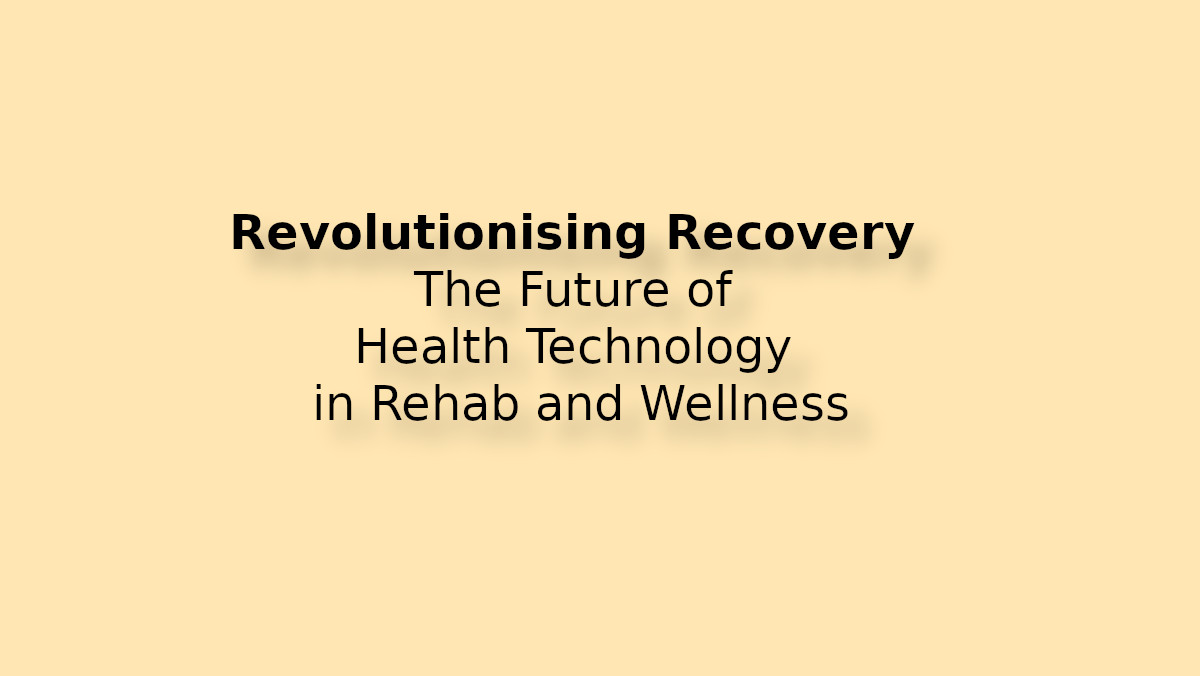Revolutionising Recovery: The Future of Health Technology in Rehab and Wellness
In recent years, the intersection of technology and healthcare has garnered significant attention, with innovations poised to revolutionise the way we approach health and wellness. As we look to the future, it is evident that health-related technology is expected to boom, offering solutions that cater to a variety of needs, including mental health, chronic illness management, and substance abuse rehabilitation. The integration of advanced technologies in alcohol and drug rehab programmes, for instance, highlights the potential for a more personalised and effective approach to recovery.

The Current Landscape
The healthcare sector has traditionally been slow to adopt new technologies, but recent advancements have catalysed a shift. The COVID-19 pandemic accelerated the adoption of telehealth services, digital therapeutics, and remote monitoring tools. This trend is expected to continue, as patients and healthcare providers alike recognise the convenience and efficiency these technologies offer. According to a report by Global Market Insights, the telehealth market alone is projected to surpass £185 billion by 2026, indicating a robust demand for remote healthcare solutions.
The Role of Artificial Intelligence
Artificial Intelligence (AI) is at the forefront of this technological boom. In the realm of diagnostics, AI algorithms are increasingly being employed to analyse medical images, identify patterns, and assist in the early detection of diseases. For example, AI-powered tools can analyse X-rays and MRIs with remarkable accuracy, often outperforming human radiologists. This not only enhances diagnostic precision but also reduces the burden on healthcare professionals, allowing them to focus on patient care.
Moreover, AI is transforming patient management systems. Predictive analytics can facilitate personalised treatment plans by analysing a patient’s medical history, lifestyle choices, and genetic information. This tailored approach is particularly beneficial in managing chronic conditions such as diabetes and heart disease, where individual responses to treatment can vary significantly.
Wearable Technology and Remote Monitoring
Wearable technology is another area poised for substantial growth. Devices such as smartwatches and fitness trackers are becoming increasingly sophisticated, enabling users to monitor their health metrics in real-time. Heart rate, sleep patterns, and activity levels can now be tracked with remarkable accuracy, providing users with valuable insights into their health.
In the context of rehabilitation, wearables can play a crucial role in monitoring patients recovering from substance abuse. For instance, devices can track physiological indicators of stress or cravings, alerting healthcare providers when intervention may be necessary. This continuous monitoring can enhance accountability and support during the recovery process, ultimately leading to better outcomes.
Innovations in Mental Health Care
The future of health technology also promises significant advancements in mental health care. Digital mental health platforms are emerging as vital tools for providing therapy and support to those in need. Apps that offer cognitive-behavioural therapy (CBT), mindfulness exercises, and mood tracking are becoming increasingly popular. These tools can serve as a first line of defence for individuals experiencing mental health challenges, making support more accessible than ever before.
Furthermore, virtual reality (VR) is being explored as a therapeutic tool for various mental health disorders, including PTSD and anxiety. By immersing individuals in controlled environments, VR can help them confront and manage their fears in a safe space. This innovative approach is gaining traction, with studies indicating its effectiveness in enhancing traditional therapeutic methods.
The Importance of Data Security
As health-related technology continues to expand, the importance of data security cannot be overstated. With the increase in digital health records and the use of wearable devices, the potential for data breaches grows. Ensuring that patient information is protected is paramount to maintaining trust in these technologies. Regulatory frameworks, such as the General Data Protection Regulation (GDPR) in Europe, are essential in establishing guidelines for data handling and privacy.
Healthcare providers must invest in robust cybersecurity measures to protect sensitive information. Additionally, patients should be educated on how to safeguard their data, fostering a culture of security and awareness.
Challenges Ahead
Despite the promising outlook for health-related technology, several challenges remain. The digital divide poses a significant barrier, as not all individuals have equal access to technology. Ensuring that all populations can benefit from these advancements is crucial. Moreover, the integration of new technologies into existing healthcare systems requires careful planning and collaboration among stakeholders to ensure seamless implementation.
The future of health-related technology is bright, with innovations set to transform the landscape of healthcare. From the integration of AI and wearable devices to advancements in mental health care, the potential for improved patient outcomes is immense. As we embrace these changes, it is essential to address the challenges that accompany them, ensuring that technology serves as a tool for enhancing health and well-being for all. The boom in health-related technology not only promises to improve individual health but also to reshape the entire healthcare system for the better.